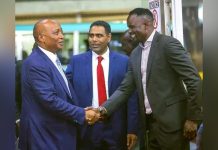Africa-Press – Lesotho. PRIME Minister Moeketsi Majoro allegedly ignored a legal warning that Lesotho’s assets were about to be seized to settle Frazer Solar’s M855 million claim.
The revelations are in stark contrast to what Majoro and the government claimed last week when it was announced that Frazer Solar was about to seize Lesotho’s assets for breaching a solar contract signed in September 2018.
Majoro told a press conference, last week, that the government was still investigating the issue. The government said the same in a statement that urged Basotho and international partners to remain claim.
However, Frazer Solar this week insisted that the government knew about the claim and the impending seizures. The company says Majoro was “personally notified – one month in advance – of the seizure of water royalties and chose not to oppose the seizure”.
It says it told Majoro about the impending seizure of the water royalties that Lesotho receives from South Africa under the Lesotho Highlands Water Project on April 21 this year.
Those royalties, confiscated this month, could be about M1 billion annually. The company has also appropriated Lesotho’s assets in Mauritius and the United Kingdom. It is now going for assets in the United States.
It would appear that the warning to Majoro in April was one of the more than two dozen the government ignored over two years while Frazer Solar was suing for damages.
The company claims the Lesotho government was notified of legal proceedings on 25 occasions over 25 months. That means the government had ample time and opportunity to challenge the proceedings before the assets were confiscated.
Arbitrator Vincent Maleka’s report supports this claim and shows that the government was aware of every stage of Frazer Solar’s case. The government started receiving letters and notices relating to the case in March 2019, beginning with a letter of demand from Frazer Solar.
That letter detailed how Lesotho had breached the September 2018 contract and the company’s claim. The letter was addressed to Tsolo, who was Minister in the Prime Minister’s Office at that time and had signed the contract, but he didn’t respond.
On July 29, 2019, Frazer Solar notified the government that it was terminating the contract and a day later it informed Tsolo that it was declaring an arbitration.
Again, the government received the letter but did not respond. The letter said the arbitration was to be held in South Africa as per the terms of the contract.
On August 7 the company requested the President of the Johannesburg Bar Council to appoint an arbitrator. A copy of the request (email and hard copy) was sent to the government.
A day later Maleka, a senior lawyer, was appointed arbitrator and the government was informed again. On August 22 Frazer Solar notified the government that Maleka had scheduled the first arbitration meeting for September 22.
Seven days before that meeting the company sent the government a procedural order detailing the Tribunal’s timetable, the arbitrator’s confirmation that he will be available and the minutes of the preliminary meeting.
Frazer Solar submitted its claim and witness statements on October 7. It served the government which, however, did not take any action. The tribunal held a procedural call on November 25 but the government did not participate despite being informed.
The government received minutes of that meeting two days later. When the hearing started on December 2 Maleka noted that the government had not submitted any explanation why it did not attend.
He repeated the same in his award in which he noted that the government had received “due notice of time, date and place of the hearing and there was no sufficient cause shown to explain its failure to attend the arbitration proceedings”.
Frazer Solar was awarded the claim on January 28, 2020, and the government received a copy but still failed to respond. Armed with the arbitrator’s ruling, Frazer Solar then approached the South Gauteng High Court for an enforcement order.
It also sought a similar order in the Business and Property Court of England and Wales. The UK court issued the enforcement order in September 2020. The South African court granted an order confirming the enforcement order on April 29 this year.
The government has both orders, including the one issued by the Supreme Court of Mauritius on May 19 this year. The government is also yet to respond to another case recently filed in the United States court.
Having failed to participate in the arbitration and allowed three court cases to go unchallenged, the Lesotho government might have a tough time undoing the damage.
In the meantime, its assets have been seized and Frazer Solar is already receiving the payments. So far Lesotho has lost its royalties for the water transfer to South Africa.
Frazer Solar is also collecting the electricity revenue that Eskom owes to Lesotho in connection with the LHWP. Lesotho’s five percent stake in the West Indian Ocean Cable Company (WIOCC), a Mauritius based company, has also been confiscated. Two properties in the United Kingdom are also likely to be seized.
For More News And Analysis About Lesotho Follow Africa-Press






